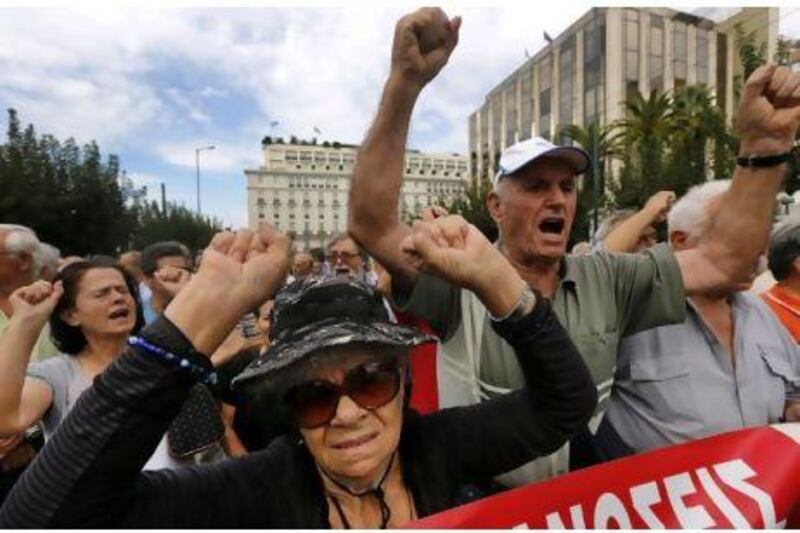BERLIN // When she touches down in Athens today, the German chancellor, Angela Merkel, a hate figure to many Greeks in the euro crisis, will be accompanied by an increased personal security detail and protected by 7,000 police officers drafted from all over Greece.
Judging by the column inches devoted to her security arrangements in the German press, one might not think she was visiting a long-standing European partner. One Greek official was quoted as saying the precautions are even greater than those during a 1999 visit by the then United States president, Bill Clinton.
Mrs Merkel's spokesman, Steffen Seibert, made the surprise announcement of her six-hour visit last Friday. "I say it's a normal visit because Greece and Germany are close partners within the EU and the euro zone and because we work very closely together," said Mr Seibert. "So it's normal that one visits each other."
The Greek prime minister, Antonis Samaras, said yesterday that Mrs Merkel's visit was good news. "We will receive her as befits the leader of a great power and a friendly country," he said in Athens.
But because Germany has been instrumental in pushing Greece to make severe austerity cuts in exchange for its bailout loans, many Greeks blame the leader personally for their country's economic meltdown. She is regularly portrayed as a Nazi in demonstration banners and newspaper front pages. Trade unions and opposition parties have vowed to bring thousands of people on to the streets to protest against her visit.
"She does not come to support Greece, which her policies have brought to the brink. She comes to save the corrupt, disgraced and servile political system," said Alexis Tsipras, the leader of the left-wing opposition Syriza alliance. "We will give her the welcome she deserves."
Much of the area around the office of Mr Samaras, where Mrs Merkel will head for talks, will be cordoned off and turned into a "red zone" where no demonstrators will be allowed, Greek officials said. Police snipers will be deployed on the roofs of surrounding buildings. The German Embassy in Athens and the local branch of the Goethe Institute, a German cultural association, will also be put under police protection.
This is Mrs Merkel's first visit to Greece since the debt crisis erupted there in early 2010. Her initial reluctance to bail out the country then won her no friends and, critics said, contributed to a domino effect engulfing other European nations because it dented investor confidence in the currency zone.
Her image deteriorated when she insisted that international aid be attached to rigorous budget cuts and reforms that have plunged Greece into its worst recession since the Second World War. The government forecasts a contraction of GDP by 6.5 per cent this year after a 7.1 per cent drop in 2011. Unemployment has reached almost 25 per cent.
The visit will give the Greek public an opportunity to vent its anger not just at Mrs Merkel, but also at two years of Greece-bashing by German media and various politicians. Examples include a famously offensive magazine cover featuring the Venus de Milo making a rude gesture and labelling the Greeks as fraudsters.
In August, a member of Mrs Merkel's centre-right coalition, Bavarian finance minister Markus Söder, said Greece must leave the euro zone, declaring: "At some point everybody's got to move out of mum's house and the Greeks have reached that point now."
German tabloid Bild suggested in an editorial that the Greeks should be waving German flags in gratitude rather than hurling abuse at her.
"The German taxpayer has had to bleed enough for the Greek disaster," the newspaper commented, urging Mrs Merkel to resist any Greek calls to loosen the terms of the aid. "Enough is enough."
In addition to meeting Mr Samaras, Mrs Merkel is scheduled to meet president Karolos Papoulias and representatives of Greek industry. It is unlikely she will be stopping her convoy to shake hands with ordinary Greeks.
Mrs Merkel's trip is part of an initiative she launched recently to improve her image, which has been tarnished in many countries by her demands that high-debt nations be subjected to crushing austerity programmes.
The German leader, known for her cool, inscrutable demeanour, has praised Italy for its "impressive" reform agenda and stressed Germany's friendship with Greece during a visit by Mr Samaras to Berlin in August. She has also come to the conclusion that Greece must remain a member of the euro zone because an exit would be too expensive and risky.
In Athens, she is expected to show sympathy with the plight of the Greeks and acknowledge the sacrifices they are making in return for foreign help. But it unlikely that she will offer much in terms of concrete concessions on aid.
That is because her tough line so far is popular among Germans and she faces an election in autumn next year. Also, she may face a rebellion in her own party in any parliamentary vote on yet more aid for Greece.
In addition, she won't be able to preempt negotiations going on between Greece and inspectors from the "troika" - the International Monetary Fund, European Commission and European Central Bank - over budget cuts for the next two years, a condition for getting the next instalment by the end of November of the current €130 billion (Dh618bn) bailout programme, Greece's second, which is keeping the country afloat.
Greece needs more time, money or both. To avoid having to arrange a third bailout, Mrs Merkel may agree to give Greece extra time to make painful cuts and to reduce the interest rates Athens pays on its EU loans.






